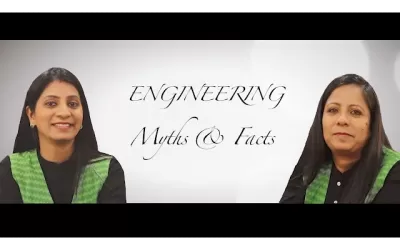What is Electrical Engineering?
When Can I Enroll for Electrical Engineering?
COURSE | ELIGIBILITY | DURATION | ENTRANCE EXAM |
Diploma | SSC/ITI Lateral entry | 4 Yrs. | |
B.E./B.Tech. | HSC with PCM | 4 Yrs. | JEE (Main), JEE (Advanced), BITSAT |
Lateral Entry after completing Diploma | 3 Yrs. | No Entrance Exam | |
*AMIIetE | HSC with PCM/B.Sc./ Diploma Engg. | 4 Yrs. | No Entrance Exam |
M.E./M.Tech. | BE/B.Tech Electrical | 2 Yrs. | GATE |
Ph.D | M.E./M. Tech in related field | 3-5 Yrs. | JEST |
* AMIIetE – Associate Membership of the Indian Institute of Electrical Engineering
NOTE: Candidates can get Direct Entry in 2nd Year of B.E / B. Tech [Electrical] after Diploma in related field.
What Personality Traits are Required to Become an Electrical Engineer?
- Problem Solving Attitude
- Ability to Grasp Things Faster
- Creativity
- Good in Technical Drawings
- Excellent Communication Skills
What Aptitude is Required to Become an Electrical Engineer?
- High Abstract Reasoning
- Above Average/High Numerical Ability
- Above Average/High Mechanical Reasoning
- Average/High Psychomotor Ability
IQ Required to Become an Electrical Engineer
Job Prospects After Electrical Engineering
- Information Technology Industry
- Petroleum & Energy Sector
- Public & Private Sector
- Teaching in Educational Institutes
- Telecommunications Industry
- Aerospace Industry
Regulatory Body
Frequently Asked Questions (Faqs) About Electrical Engineering
1. What is electrical engineering, and what do electrical engineers do?
Electrical engineering is a field of engineering that deals with the study, design, and application of electrical systems, electronics, and electromagnetism. Electrical engineers work on a wide range of projects, from designing electrical circuits to developing power generation and distribution systems.
2. What are the key subfields within electrical engineering?
Subfields of electrical engineering include power systems engineering, electronics engineering, control systems engineering, telecommunications engineering, and computer engineering, among others.
3. What skills are essential for a successful career in electrical engineering?
Key skills for electrical engineers include problem-solving, critical thinking, mathematical proficiency, programming, and strong communication abilities.
4. How long does it take to become an electrical engineer, and what is the educational path?
Becoming an electrical engineer typically requires a bachelor’s degree in electrical engineering or a related field, which takes about four years to complete. Some positions may require a master’s or doctoral degree for advanced research or teaching roles.
5. What are some common job opportunities for electrical engineers?
Electrical engineers can work in various industries, including power generation and distribution, telecommunications, electronics manufacturing, aerospace, and automotive. Common job titles include electrical design engineer, control systems engineer, power systems engineer, and electronics engineer.
6. What are the emerging trends in electrical engineering today?
Emerging trends in electrical engineering include renewable energy technologies, smart grid development, Internet of Things (IoT) devices, electric vehicle (EV) technology, and advancements in wireless communication systems.
7. How do electrical engineers contribute to sustainability and environmental efforts?
Electrical engineers play a significant role in developing sustainable energy solutions, such as solar and wind power systems, electric vehicle charging infrastructure, and energy-efficient building designs.
8. What certifications or licenses are required for electrical engineers?
The requirements for certifications and licenses vary by location and specific job responsibilities. In some cases, electrical engineers may need to obtain a Professional Engineer (PE) license.
9. How can I stay updated on the latest advancements in electrical engineering?
Staying updated involves attending conferences, workshops, and webinars, reading industry publications, and participating in professional organizations like the Institute of Electrical and Electronics Engineers (IEEE).
10. What are the ethical considerations in electrical engineering, especially regarding safety and privacy?
Electrical engineers must prioritize safety and privacy when designing and implementing electrical systems, ensuring that their work meets all relevant safety standards and regulations.
11. Are internships or co-op experiences important for electrical engineering students?
Yes, internships and co-op experiences provide valuable practical knowledge and exposure to real-world projects, enhancing a student’s understanding and employability.
12. How does electrical engineering contribute to technological advancements and innovation?
Electrical engineering innovations have led to advancements in telecommunications, electronics, automation, and energy efficiency, shaping the modern world and improving quality of life.






